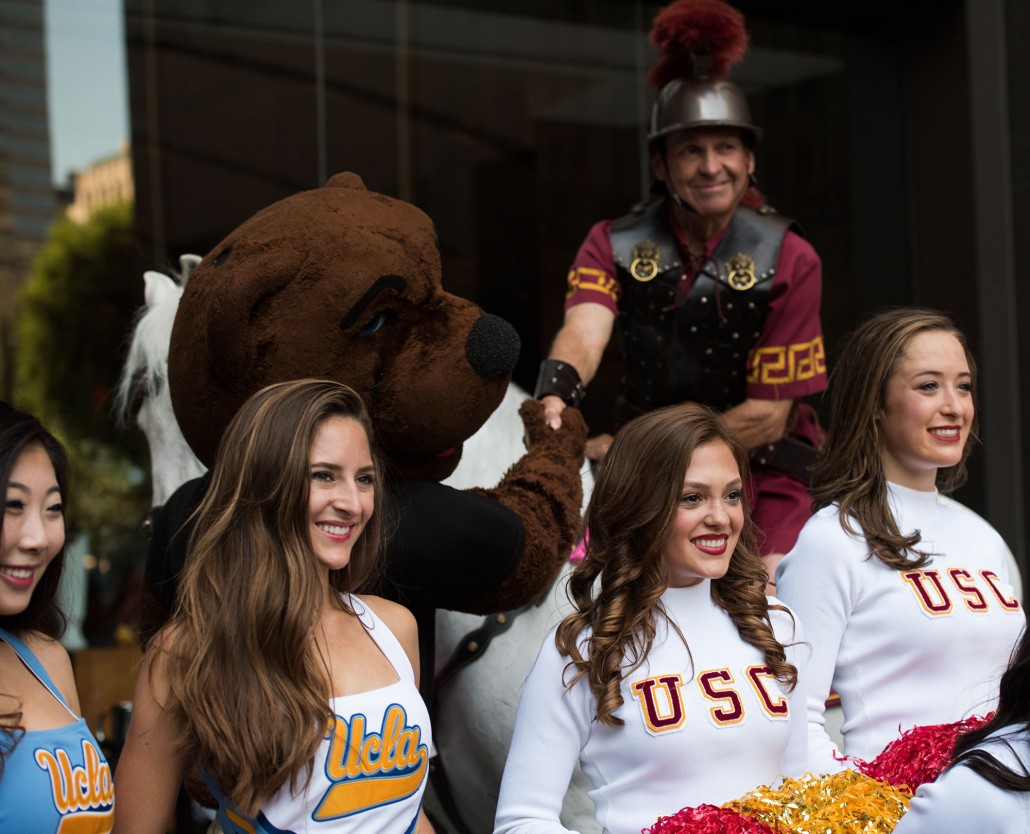USC, UCLA join together at rally for cancer research

Burying the hatchet · The USC Song Girls, UCLA Spirit Girls and mascots Traveler and Joe Bruin participate in the rally Wednesday. – Mariya Dondonyan | Daily Trojan
In spite of the schools’ longstanding sports rivalry, representatives from USC and UCLA came together Wednesday afternoon to support the second annual Rivals United for a Kure Rally. The event, hosted by the Irvine-based nonprofit Kure It Cancer Research, aimed to raise awareness and funds for cancer research at the UCLA Jonsson and USC Norris Comprehensive Cancer Centers.
The rally, which took place in Downtown’s City National Plaza, kicked off with a performance from the Spirit of Troy marching band accompanied by the USC Song Girls, followed by the Bruin Marching Band and Spirit Girls. Both schools’ mascots — Traveler and Joe Bruin — made an appearance and offered photo ops for attendees. Throughout the event, guests could enjoy free food giveaways and purchase raffle tickets or “Cancer Sucks” t-shirts, the profits from which would be donated to Kure It.
According to studies by the National Cancer Institute, one in two men and one in three women will be diagnosed with a form of cancer each year.
Kristen Rhynerson, associate director for Cancer Research at Kure It, said that because cancer is so common, more people should be invested in searching for a cure.
“Cancer is a disease that affects us all,” Rhynerson said in an email to the Daily Trojan. “We hope that students will unite with the greater Los Angeles community as Trojans and Rivals United.”
According to USC alumnus and former Cleveland Browns starting quarterback Paul McDonald, Kure It chose to hold the rally at the City National Plaza due to its prime location for students and alumni of both schools, as well as professionals working in the area. McDonald said that the organization owed much to its sponsor, City National Bank.
“We wanted to bring [guests] Downtown — that’s why we’re here at this unbelievable plaza,” McDonald said. “City National Bank … has been incredible for us each and every year.”
Students such as Max Rorsted, a sophomore majoring in economics and political science, helped make the event possible by working the sales booths as volunteers. Rorsted, a member of the Phi Kappa Psi fraternity, said that his fraternity decided to volunteer in order to show that any sports rivalry is overshadowed by the need to work toward a cure for cancer.
“A lot of us have lost friends or family members — for example, my grandmother passed away from cancer,” Rorsted said. “It’s something that each of us has a chance to make an actual difference in once we put in some effort. Since it affects every one of us personally, we are bound to make a contribution to the community and just put our work and effort in to make a better society.”
Rivals United aims to raise $500,000 by the end of the year, which is part of a larger $1 million goal that the organization hopes to meet within two years. Since 2012, Rivals United has raised more than $1.1 million for cancer research, and hosts multiple fundraisers at both USC and UCLA sporting events. Most prominently, representatives from Rivals United will be on campus at the Conquest concert and rally before the USC-UCLA football game in November.
Kure It was founded by USC alumnus Barry Hoeven after he was diagnosed with kidney cancer in 1998, an event that inspired him to reach out to others afflicted with cancer and raise both funds and awareness for the cause. In 2007, Hoeven partnered with City of Hope to raise $400,000 for a cancer research fund, which became a nonprofit in 2010. In founding Kure It, Hoeven aspired to create a nonprofit that was able to raise money for vital and collaborative cancer research, which is why Rivals United aims to bring USC and UCLA together in seeking a cure.
Rebecca Patterson contributed to this report.
